CTP Episode of the Day - 12.15.06 - Alone
Today's Cherished Episode: Alone (8x19)
Original Air Date: May 6, 2001
Written By: Frank Spotnitz
Directed By: Frank Spotnitz
Teamed with a new partner while Scully's on maternity leave, Doggett investigates the mysterious disappearance of two men. After he disappears as well, Mulder defies orders and searches for him.
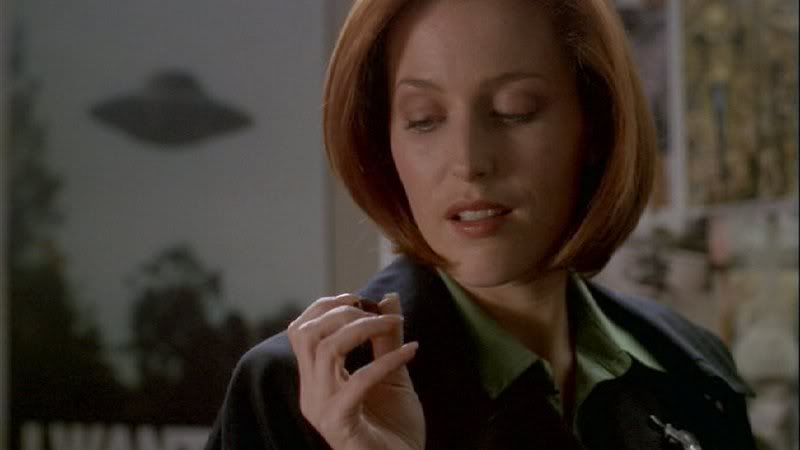
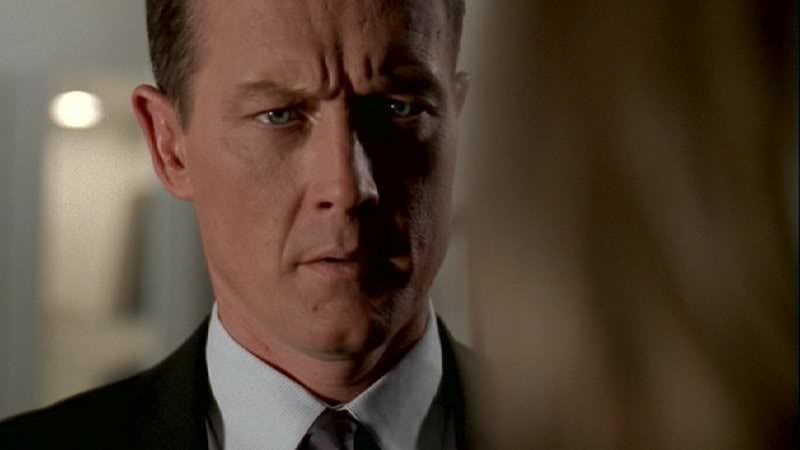
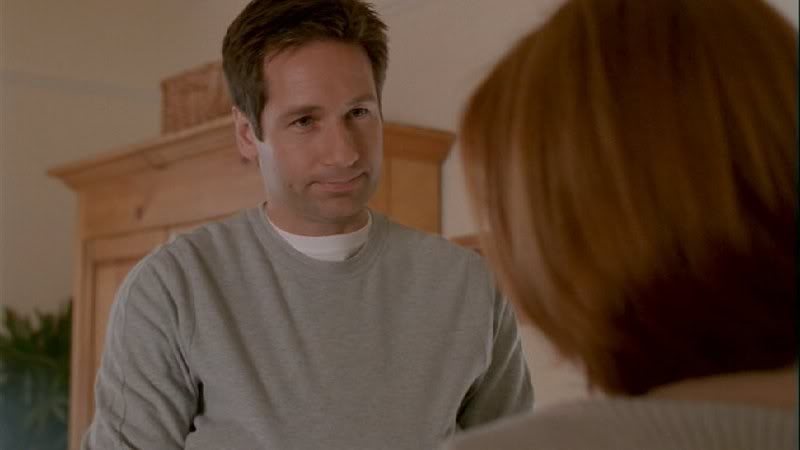
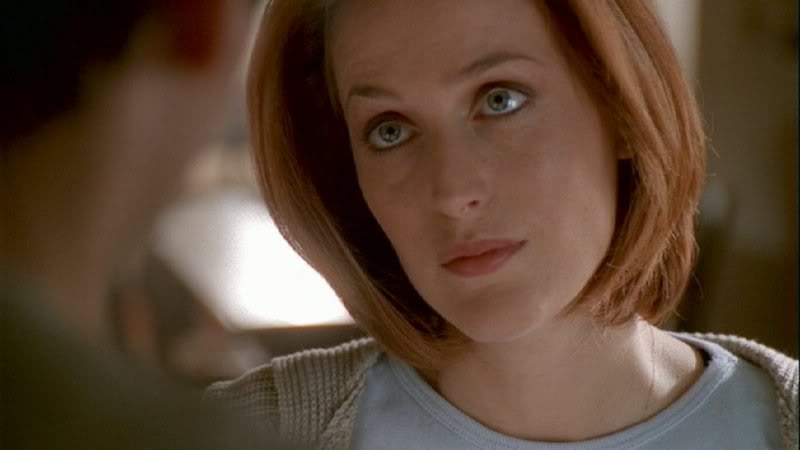
"Hey, don't forget this. Relax the back, breathe in, breathe out."
"How do you know all these things, Mulder?"
"I'm unemployed. I have a lot of time on my hands. Oprah. I watch a lot of Oprah."
Some "Alone" Tidbits & Musings:
-- The title refers to the fact that by the end of the episode Doggett will find himself "alone" managing the X-Files -- a place he never imagined he would be.
-- The original title of the episode was "A Dream Whose Sleep," which is a partial line from an e.e. cummings poem titled "the great advantage of being alive." (The poem appears at the end of today's CTP.)
-- This was the first episode directed by X-Files producer and writer Frank Spotnitz.
-- "It was very late to attempt directing for the first time," Spotnitz said, but he eventually warmed to the idea. "It's a very difficult show, because performance is really important to make something that's kind of unbelievable seem believable. There are also very specific visual requirements. And when you're trying to scare people or create suspense, if the camera's not in the right place by even a few degrees, it makes a huge difference. But when you've written the material yourself, it's already in your own head, and you understand all of the dramatic objective."
-- "When you decide to take your first shot as a director," said Frank Spotnitz, "there are two ways to go about it. One -- just stick your toe in the water and try to come up with something simple and then hope that you don't screw it up. Two -- just go all out no holds barred. Well, I just decided to go for number two."
"As you write you imagine all these great shots that are possible to bring your words to life," Spotnitz said. "But when you actually direct, you realize that there are a lot of limitations -- lighting, budget, time, etc. -- that don't always allow those great shots to happen. I really didn't know how to prepare, so I designed every shot in my head from my script and more or less I was able to follow the original plan I came up with. All the time I had spent in the editing room over the years really helped me to design the shots and know how I wanted the episode to flow and how I wanted to transition from one scene to another."
-- Lynne Willigham, a long-time editor on the show, edited the episode and the first piece she did was the teaser. "She knew I was anxious, so she called me down to take a look at the teaser after she had edited it," Spotnitz said. "And once I saw that, I felt like everything would be okay."
-- "When I wrote this episode, it had many special requirements," recalled Spotnitz. "I knew it would be the last stand-alone with Mulder and Scully. David was leaving the series and so I wanted it to be special and I thought of Scully leaving the X-Files. It was a way to look back at the show and some of the fond memories that we as writers and that the viewers had of the Mulder/Scully era."
-- To recall those fond memories, Spotnitz wanted to make a lot of references to old X-Files episodes, so right off the bat when Scully cleaned out her desk, she pulled out the fused dime/penny seen in "Dreamland I and II" and Queequeg's dog tag from "Quagmire." "Most of the things I included were things the casual viewer wouldn't get," Spotnitz said. "But these were things I knew the die-hard fans would recognize right away, and those were the kind of things I wanted to concentrate on."
-- "I thought that Scully giving Doggett the keychain that Mulder had given her in 'Tempus Fugit/Max,' a keychain that represented teamwork, made sense thematically," said Spotnitz. "Then at the end, Doggett passed it on to the fan he felt deserved it. It showed the link between all of us that made the show what it was."
-- Spotnitz said that Scully's words to Doggett as she prepared to leave the X-Files office were basically his sentiments about the character of Doggett and what he had meant to the show in Season 8. ("It symbolizes team-work, partnership. It means no-one gets there alone. And after this past year and everything that we've been through, it just ... I wouldn't be here without you.") "Doggett helped to get us through the eighth season," Spotnitz said, "And I was very grateful to him."
-- Interesting to contrast Scully's departure from the X-Files with Mulder's, which occurred in the previous episode ("Vienen"). Mulder, the man who was always obsessed by the work, left without a backwards glance, taking nothing with him, seemingly ready for a crack at a different life and fatherhood. Conversely, Scully, the woman who was constantly yearning to "get out of the car" finally got the chance she was hoping for and yet it was harder for her to leave the work behind than she thought it would be. I thought it was a great example of how these two had grown and changed over the years.
-- Special Agent Leyla Harrison was named for on-line X-Files fan Leyla Harrison, whose life was tragically cut short in February 2001 when she lost her battle with skin cancer.
-- "When she was ill with a recurrence of her cancer, a friend of hers wrote to me and asked me to write to her, so I did," Spotnitz said. When he learned that Leyla had passed away, he was preparing to write the episode that would become "Alone" about a young FBI agent who knew and loved everything about the X-Files and Agents Mulder and Scully -- a "fan" of the agents and their work. "I hadn't decided if it was a man or woman yet," he said. "But when Leyla passed away, it felt like too perfect a way to pay tribute to her."
-- Spotnitz noted that Harrison was also a well-respected writer of X-Files fanfiction, and noted he felt flattered that fans wrote about the show's characters. "I think it's an incredible compliment," he said. "When people are writing fanfiction, it's a very sure sign that these characters have become dimensional enough to them that they justify that sort of time and thought."
-- "I knew that Jolie Jenkins was perfect for the part of Leyla as soon as our casting director Rick Millikan brought her in," Spotnitz said. "She was cute and energetic and she brought out the 'Clint Eastwood' in Doggett -- that he would eventually grow to like her and feel protective of her. She added to the charm and humor of the episode -- the lightness against the darkness -- and she made it easy to build empathy for the character because her heart was in the right place."
-- "Most of the directing decisions I made were based on what I'd seen the great directors on our show do over the years," said Spotnitz. "Kim Manners, Rob Bowman, David Nutter -- I tried to follow their example. I tried to keep it subtle, nothing too showy."
-- "The first cut of the episode was nine minutes too long," Spotnitz explained. "I cut out as much as I could, and that was okay, but then it was two minutes too long. Getting rid of those last two minutes was very hard, but finally I got it down to the right length. It was very painful, though."
-- "The monster was the least interesting part of this episode," Spotnitz said, "because I wanted the episode to be about the X-Files -- about Mulder and Scully pursuing their investigation one last time in an unorthodox manner and leaving the X-Files and about Doggett taking them over. If I had made the monster more complicated, it would have taken away from the other parts of the episode that I wanted to concentrate on. So I made it pretty straightforward from the very beginning, really no redirection or red herrings. I think it's pretty obvious the first time the viewer sees Dr. Stites that he is somehow involved with the monster."
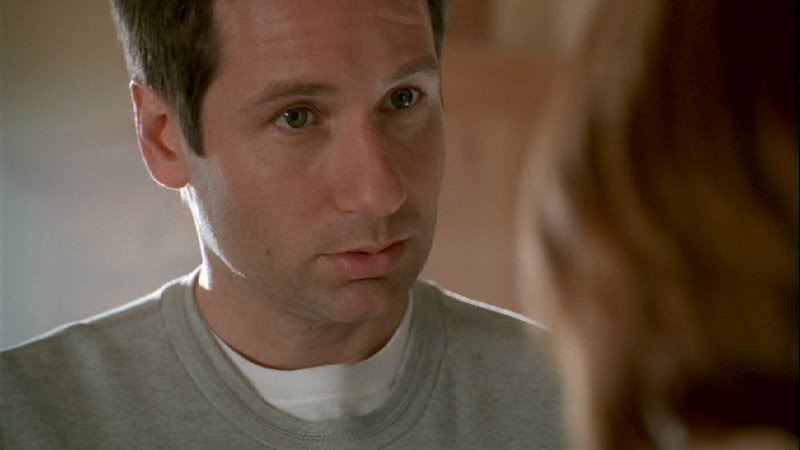
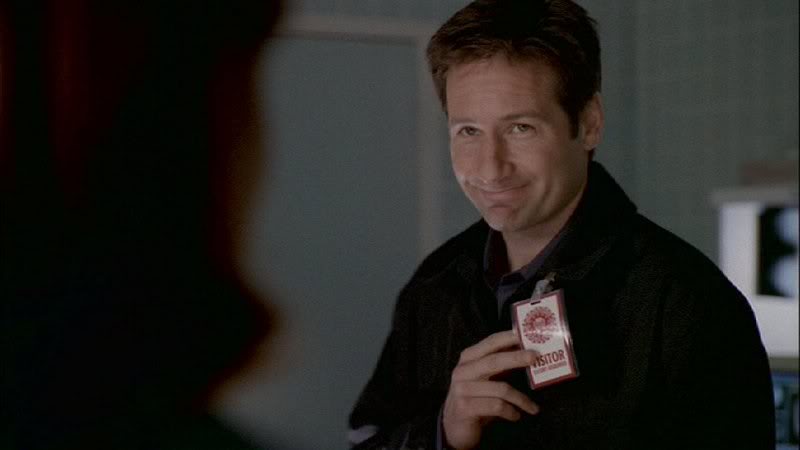
-- Spotnitz set part of the episode in Ellicot, New York, which is a real town near Buffalo, because his former assistant, Michele Fazekas, grew up in Buffalo. (The character in "Detour," another episode that Spotnitz wrote, was named after her.) Spotnitz also patterned Agent Harrison's dialogue after the way Fazekas talked.
-- The exteriors in the wooded area outside the Sacks's house were shot in Topanga Canyon which is near Malibu. The home used as the Stites mansion was located in Encino, and the exteriors and some limited interiors were shot there. At the owner's insistence, cast and crew had to be extremely careful while filming inside the mansion (only the shot of Doggett entering through the door was shot inside). "We spent a lot of time -- too much time -- making sure that everything was protected and that we didn't scuff the hardwood floor," Spotnitz said.
-- Spotnitz noted that two shots in the episode were "stolen" from a couple of his favorite movies. The inspiration for the scene in the woods where Doggett heard something and viewers saw the Salamander Man's tail wriggling out of screen was a scene from Planet of the Apes where the astronauts were skinny dipping and their clothes started to disappear from the shore. And the inspiration for the shot of Stites stepping on Doggett's fingers while he was trying to escape from the cave was North by Northwest.
-- "One of the biggest reasons I ended up directing this episode was David Duchovny," Spotnitz said. "I had been reluctant to try directing earlier because between writing and producing, I had a pretty demanding schedule and that kept me very busy. And over the years I saw some pretty great directors who worked on our show just barely make the schedule, so that was intimidating. But David Duchovny encouraged me to direct before it was too late, and I finally decided that I would be sorry if I didn't do it before David left the show. So I just barely made it under the wire."
-- "David is great to work with because he is not only a great actor, and very funny and charming, but he really stimulates your thinking and challenges you to do better," said Spotnitz. "The scene between Mulder and Scully as they were preparing to go to Lamaze class was improved immeasurably by the ad libs that he came up with on the set."
-- "It was strange to see Mulder and Scully in that situation -- getting ready to go to Lamaze class," Spotnitz quipped. "At the time 'Alone' aired, we still had not revealed the paternity of Scully's baby, although Mulder and Scully presumably knew whether they had consummated their relationship. And so the scene was meant as a tease -- did they or didn't they? Was Mulder just being a good friend helping her with Lamaze class or was it more?"
-- "Later," added Spotnitz, "we found out it was more."
-- "Even watching the episodes a few years after the series has ended, I am struck by the chemistry between David and Gillian," Spotnitz mused. "You can watch an episode with the sound off, and immediately you are drawn to their eyes and you can see the chemistry. They don't need any words."
-- The book Doggett found on Stites' desk was "The Sixth Extinction: Patterns of Life and the Future of Human Kind." Written by renowned paleoanthropologist and environmentalist Dr. Richard Leakey and science writer Roger Lewin in 1995, the book laid out the historical record of the Earth's five previous mass extinctions and argued that the sixth was currently underway. Of course, this subject was touched upon in the X-Files's seventh season premiere "The Sixth Extinction/The Sixth Extinction II: Amor Fati."
-- Jolie Jenkins had never handled a gun in any acting role, Spotnitz said, "so that actually worked well for her character's inexperience."
-- "I wish I'd had more for Mitch [Pileggi] to do in this episode," said Spotnitz. "I wrote in Skinner's character because I just wanted to work with Mitch, so I wrote in some things for him to do. I'm sure it wasn't too demanding for him as an actor, but I didn't want to miss the opportunity because I didn't know if I'd be directing again."
-- The scene of Scully talking to Skinner on the phone about Doggett was the first scene of the episode Spotnitz shot.
-- Most of the scenes that took place in the cave where shot by the second unit crew. Spotnitz noted that the show usually had two units working almost all the time. The main unit would shoot for the first eight days and the second unit would shoot the final three days and did most of the insert shots (close-ups of objects that don't involve the principal actors). "We had lost our regular second unit crew at this point in the season," Spotnitz recalled. "Most of them had gone off to do a movie. I inherited a replacement crew, but they all did a great job."
-- "I wished I could have given Mulder and Scully more screen time together," Spotnitz said, "but with each episode you have objectives that have to be met and I could only achieve so many of them."
-- "David is such a smart actor," said Spotnitz. In the scene where Mulder found Scully doing an autopsy, he noted that Duchovny "did not want to play it sentimental, and that choice gives tension to the scene. He doesn't want her to be there, he wants her to go home, so he says he will go and find out what happened to Agent Doggett."
-- The Salamander Man's ability to crawl along walls and ceilings was created using an effect similar to that created by Fred Astaire in the film Royal Wedding. The sets were built and anchored inside a rotating "barrel" which turned simultaneously with the camera, creating the impressive special effect.
-- The character of Gary Sacks was named for Frank Spotnitz's oldest friend -- Gary Sacks from Phoenix, Arizona, whom Spotnitz has known since the second grade. "I thought it was a nice tribute to kill him in this episode," Spotnitz joked. Spotnitz didn't think it would be so nice to kill his friend's father, however, so he didn't use Gary's father's real name as the name of Gary's father in the episode.
-- "Mulder was always such a troublemaker," Spotnitz laughed. "I loved seeing him do that." Spotnitz revealed that David Duchovny didn't like it when Mulder was too smart or knew too much. "That was the discussion we had that day on the set [when filming the scene where Mulder first met Stites]," Spotnitz recalled. "How to make this interesting but not too easy for Mulder. You don't hear that too often from a leading man -- that they don't want their character to be too smart. That is a lot of what made Mulder so appealing and so lasting as a hero -- his humanity and his frailty and his imperfections in so many ways. He was not James Bond."
-- Robert Patrick and Jolie Jenkins wore specially-made contact lenses to make it appear there was something wrong with their eyes. "Neither Robert nor Jolie wore contact lenses in real life," Spotnitz said, "and these were quite uncomfortable -- especially after 18-hour days."
-- Spotnitz had Mulder munching on sunflower seeds as another nod to the nostalgia of the show. "I tried to find as many of those things as I could," Spotnitz said. "In fact, I had included a scene where Scully called 'Danny' that ended up on the cutting room floor. Long-time fans know that Danny was a guy Mulder and Scully used to call all the time to get information and we never once saw him or met him."
-- "We called them the tech explain scenes," Spotnitz said about scenes like the one in the episode where Scully and the Assistant discuss the science of the case. "They were stock-in-trade for the X-Files, but we always tried to make them interesting. And we always tried to have the real science behind the case, whatever it was. Everything was pretty much scientifically accurate."
-- "The night we shot the scene where Mulder is chasing the Salamander Man across the mansion lawn, David kept joking that he could catch the guy, no problem," recalled Spotnitz. "And actually he could, so we had to make him slow down. David is a very fast runner and a very good athlete."
-- The Salamander Man was actually propelling himself along on a skateboard.
-- David Duchovny kept calling the Salamander Man "Lawnzilla."
-- "The Salamander Man's morph into Stites was a visual effect we couldn't have done when the show started," Spotnitz said. "It just shows how far the art and technical capabilities have come in such a short time."
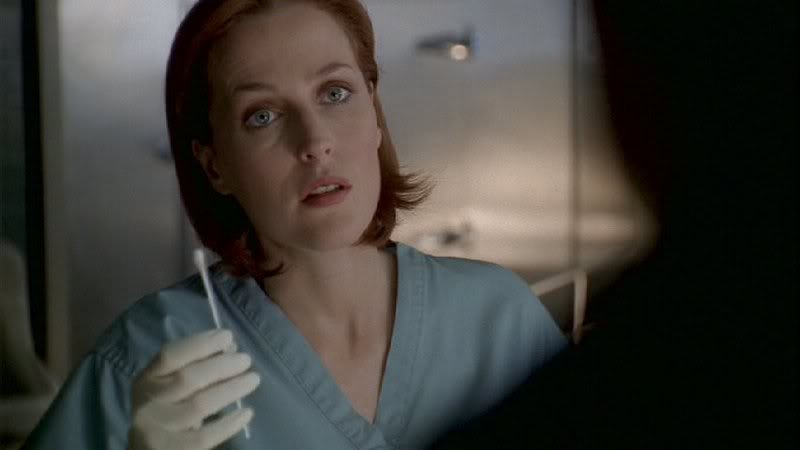
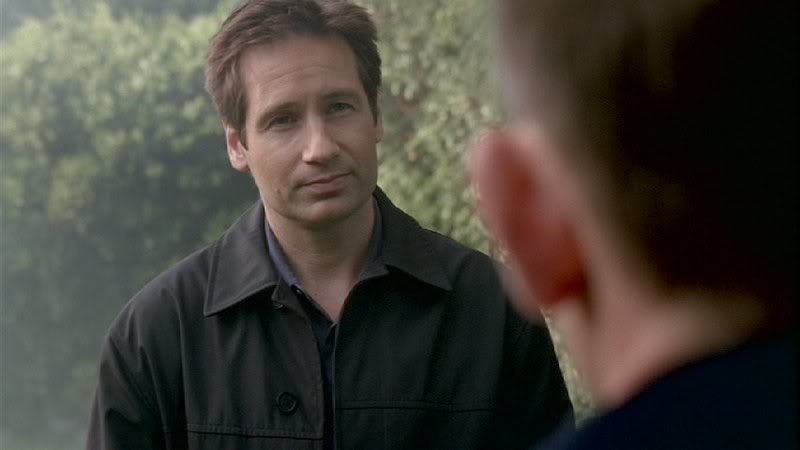
-- Spotnitz knew there was a risk that Agent Harrison would be considered a "lightweight" character so he wanted her to have the moment of realization and solve the case before anyone else. "The fact that she unraveled the mystery before anybody else was a validation of her character in a way," he said.
-- Spotnitz had Duchovny and Patrick ad-lib most of their dialogue in the scene where Doggett is trying to shoot the monster. "I thought that was the best way to make it exciting, with them shouting back and forth in an unscripted fashion."
-- "When I started to prep the episode, I didn't know how it was going to end," Spotnitz said. "I hadn't written Act 4. So as I was preparing as a director, I also had to finish writing. I was pleased with the climax in the cave, giving both Mulder and Doggett the opportunity to be heroic."
-- "The episode had a very elegiac feeling to me," said Spotnitz. "There was a baton being passed. We were leaving the Mulder/Scully era and going on to the Doggett/Question Mark era, and I tried to elude to that in the scene outside Leyla's hospital room. There was initially a lot more to that scene, but it had to be cut for time."
-- "In the last scene between Mulder and Scully and Leyla, I thought Jolie played it just right," Spotnitz said. "Very charming. I didn't script Mulder and Scully's response to Leyla's final question. I just put something general in the script that they were going to talk about something from the feature film, how the agents got back from Antartica when Mulder's Sno-cat ran out of gas. That was always a question that fans wanted the answer to, and I thought it would be funny and self-deprecating to bring it up here."
-- "David and Gillian both have wonderful comedic timing, and I just thought it would play better having them ad lib their response rather than trying to script every word they said," recalled Spotnitz. "I had more than one camera running so that I could use different angles, but as it turned out, it played best just with a two-shot."
-- "David gave me some great directing help in that last scene," Spotnitz said, "because I had Jolie smiling and laughing while they bickered and he said 'do one where she doesn't smile, where she's just wondering how to react to these people.' And he was right -- it was funnier that way because you had that tension instead of releasing it by letting her smile and laugh along with the rest of us."
-- "Some people said it was weird to hear Mulder and Scully bicker like an old married couple, but I thought it was exactly right and where they were in their relationship," said Spotnitz. "And it again played on the question -- were they or weren't they? And you go from that shot of the two of them to Doggett the outsider -- now ready to take over the X-Files alone."
-- "I'm always amazed at how much better Mark Snow makes the show," Spotnitz said. "His score adds so much." A perfect example if the variation on the X-Files theme that plays softly underneath Mulder and Scully's banter in that last scene. It underscores perfectly the heart and soul of the X-Files. Sometime when you watch the episode, tune out the dialogue (even though it's wonderful) and listen to the score.
-- Spotnitz's gift to the crew who worked on the episode was a bottle of nice wine with a label that read "Stite's Private Reserve -- Harvest Red -- Liquified for Easy Digestion" and had a picture of a little salamander and the X-Files logo on it. "Collector's items now," Spotnitz joked, "on ebay."
-- Zach Grenier (Dr. Herman Stites) played Andy Cramed in Deadwood and has most recently been seen in The Nine as Sean McDermott.
Once & Future Retreads: Jolie Jenkins played Agent Leyla Harrison again in Season 9's "Scary Monsters." Jay Caputo (The Salamander Man) also played the The Bat Thing in "Patience" (Caputo is primarily a stuntman).
-- "I didn't expect to enjoy directing as much as I did," said Spotnitz, "but I did enjoy it, and I hope the fans like the episode. Directing is enormously satisfying. And when you've written your own material, you've already done an enormous amount of the prep work for yourself as a director. Directing "Alone" made me want to have a crack at doing something completely different, and so the episode I directed in Season 9 definitely was ("Daemonicus"). Also, in Season 9 I realized that if I were going to do it again, I'd better do it early, rather than late [in the season], because doing 'Alone' at the end of the year almost killed me."
-- I know some people didn't agree, but I still think that "Alone" was one of the finest fan tributes you're ever likely to see. I didn't know the real Leyla Harrison, but I can't help think she would be pleased and touched by the way in which TPTB at 1013 chose to honor her -- and all the fans -- for supporting the show. Just like us, Special Agent Leyla Harrison was a "fan" of the X-Files; she knew all the cases backward and forward and could recite the details chapter and verse. She was a stickler for continuity. She believed in the work and was incredibly proud and excited to be getting the chance to follow in the footsteps of her two favorite agents. And, of course, she was not afraid to ask the questions that all fans of the X-Files wanted answered! I still believe this was an amazing gesture, recognizing an amazing fan.
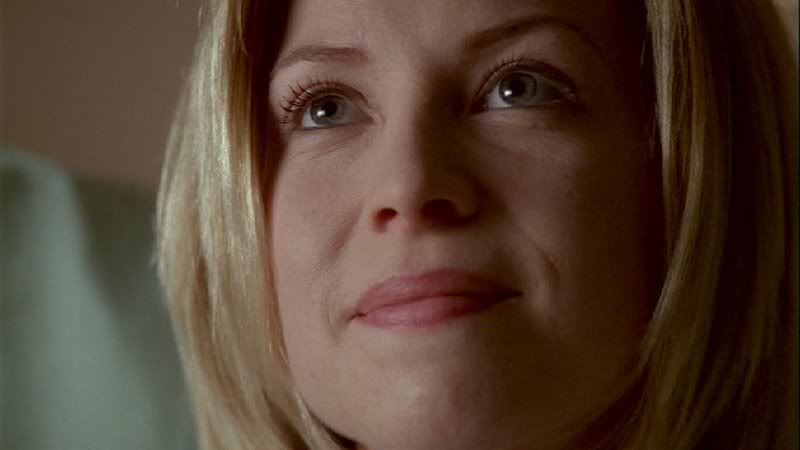
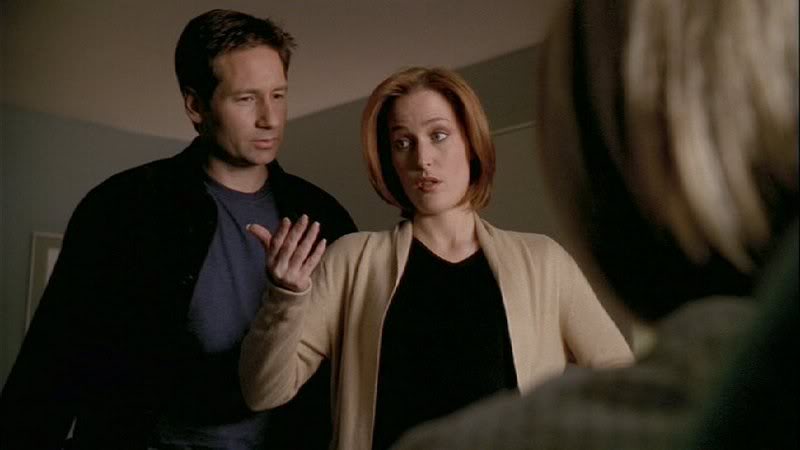
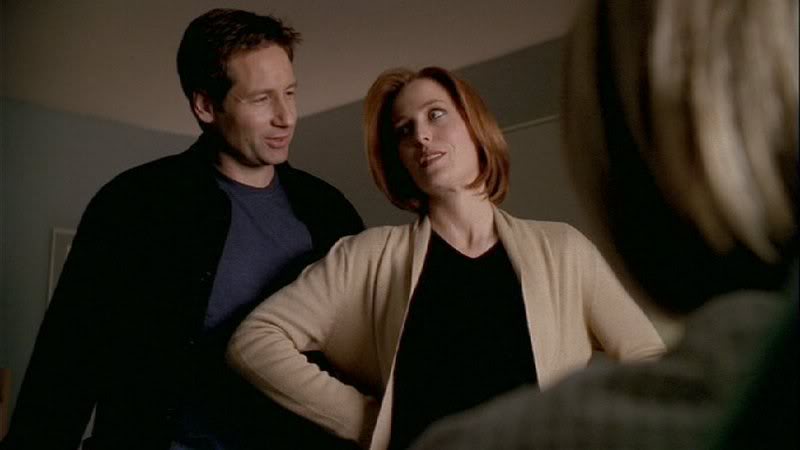
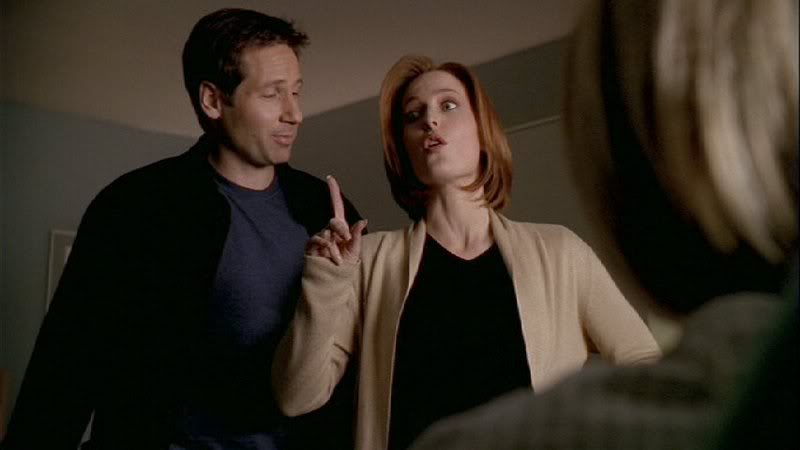
(Thanks to chrisnu for today's pics.)
-- And with that, Season 8 becomes the first Season that we have completely finished in the "Episode of the Day"! Only 12 more episodes to go!
Please share your first impressions, favorite (or cringe-worthy) moments, classic lines, favorite fanfic, nagging questions, repeated viewing observations, etc., as today we celebrate "Alone."
Polly
The great advantage of being alive by e.e. cummings
the great advantage of being alive (instead of undying) is not so much that mind no more can disprove than prove what heart may feel and soul may touch --the great (my darling) happens to be that love are in we, that love are in we
and here is a secret they never will share for whom create is less than have or one times one than when times where that we are in love, that we are in love: with us they've nothing times nothing to do (for love are in we am in i are in you)
this world (as timorous itsters all to call their cowardice quite agree) shall never discover our touch and feel --for love are in we are in love are in we; for you are and i am and we are (above and under all possible worlds) in love
a billion brains may coax undeath from fancied fact and spaceful time no heart can leap, no soul can breathe but by the sizeless truth of a dream whose sleep is the sky and the earth and the sea. For love are in you am in i are in we